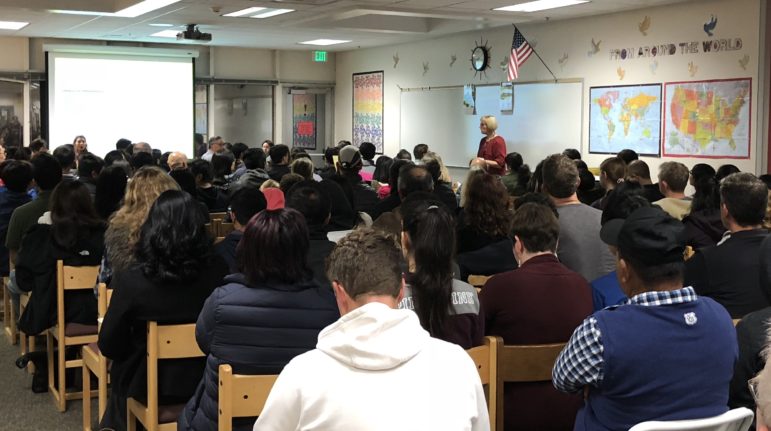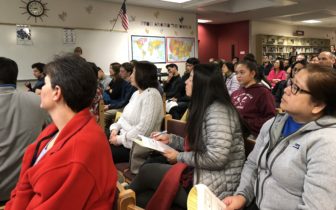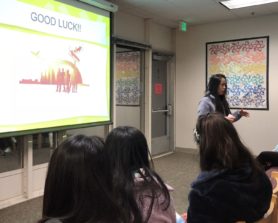

To address the lack of internship coverage within the high school curriculum, on Wednesday Nov. 14, Biotechnology and AP Biology teacher Katie Ward delivered her annual talk through the Parent Teacher Student Organization (PTSO) at Aragon’s Library on obtaining summer internships.
The school publicized the event via email and phone call, and over 80 parents and students attended. According to Ward, the event has been annual for around five or six years.
“The impetus [for the presentation] was about being more explicit about teaching some of these things that don’t get taught during class time,” Ward said. “I had a lot of kids coming to me in late-March and early-April saying, ‘Ms. Ward I want to do a summer internship,’ and I was crestfallen at that point because all the deadlines have passed and it’s kind of too late to try and find an opportunity.”

Ward believes in the importance of experiential learning.
“We’re not building textbooks here, we’re building people, and so part of building a person is building their knowledge base, but it’s also about building their skills base, and so that set of skills is employability skills, interpersonal skills … I’m just trying to be mindful of helping others learn about themselves that way as much as they’re learning about Biology, or Biotech, or [another subject].”
During the presentation, Ward passed out a list of internships and directed her audience to websites that included information on resume and cover-letter writing.
“I put together some of my own ideas about what I seen and then gone out and did some research with respect to which internships I seen kids applying to, what other internships are out there, and also really looking into how do I help a kid get prepared,” Ward said.
In terms of the application process, Ward advised students to research early and plan ahead for application deadlines and requests for letters of recommendation.

Then, at the end of her presentation, she invited some of her current and past students to talk about their own internship experiences. Student presenters included senior Andre Gu, senior Emily Xu, junior Samantha Hou and junior Shirleen Fang.
Hou presented on her experience with the California State Summer School for Mathematics and Science (COSMOS), a four-week residential summer internship program at the University of California.
“Last year I was here and [Ms. Ward] talked about COSMOS, so one of the reasons I applied was because I heard it from her here,” Hou said.
COSMOS is a competitive program that requires an application process. Each UC campus offered different clusters of study, and Hou applied to UC Irvine’s Genes, Genomes and Biocontrol cluster. At Irvine, Hou cultured Nematodes on plates and extracted their DNA to use for RNA sequencing. She compared the genomes of two species and presented the poster at the end of the program.
“I chose the cluster because I was interested in genetics, and [the program] helped me realize that it’s still something I would like to study,” Hou said. “It helped me expand on my interest in biology.”
For some parents such as Elizabeth Guo, the student experiences were the most memorable part of the night.
“Just as Ms. Ward was saying, experience is everything,” Guo said. “There is always something good that comes out of every experience. One of the [student presenters] mentioned she thought wanted to do astronomy, but then after she did some of the work she was like ‘eh, that’s not what I want to do,’ so it’s a good time to find those things out now … This is the time to do it—from anywhere between sophomores to juniors to seniors.”
Overall, Ward said the response to the presentation seemed positive.
“The comments that I got at the end from the few parents I was able to talk to seemed favorable,” Ward said. “People seemed appreciative of the opportunity and the information and so hopefully that was a good sign that it went well.”
Looking forward, Ward is considering to expand presentation coverage for non-science related internships.
“Obviously, I teach science so I know the science internships better than I know those other ones,” Ward said. “Maybe it’s a good idea at this point that I do a little bit more outreach to some history teachers, some English teachers … because I want people to know that it’s not just about science.”



